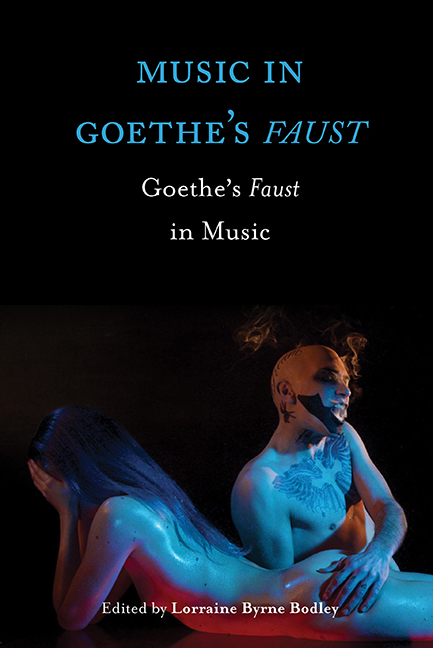Book contents
- Frontmatter
- Dedication
- Contents
- List of Illustrations
- Contributors
- Acknowledgements
- Abbreviations Used in the Notes
- Introduction. Rhapsody and Rebuke: Goethe's Faust in Music
- Part I Goethe's Faust: Content and Context
- 1 The Redress of Goethe's Faust in Music History
- 2 Wagering on Modernity: Goethe's Eighteenth-Century Faust
- 3 Reflectivity, Music and the Modern Condition: Thoughts on Goethe's Faust
- 4 Music and Metaphorical Thinking in Goethe's Faust: The Example of Harmony
- 5 Faust: The Instrumentalisation of an Icon
- Part II Legacies: Goethe's Faust in the Nineteenth Century
- Part III Topographies: Stagings and Critical Reception
- Part IV New Directions: Recent Productions and Appropriations
- Select Bibliography
- Index
2 - Wagering on Modernity: Goethe's Eighteenth-Century Faust
from Part I - Goethe's Faust: Content and Context
Published online by Cambridge University Press: 30 August 2017
- Frontmatter
- Dedication
- Contents
- List of Illustrations
- Contributors
- Acknowledgements
- Abbreviations Used in the Notes
- Introduction. Rhapsody and Rebuke: Goethe's Faust in Music
- Part I Goethe's Faust: Content and Context
- 1 The Redress of Goethe's Faust in Music History
- 2 Wagering on Modernity: Goethe's Eighteenth-Century Faust
- 3 Reflectivity, Music and the Modern Condition: Thoughts on Goethe's Faust
- 4 Music and Metaphorical Thinking in Goethe's Faust: The Example of Harmony
- 5 Faust: The Instrumentalisation of an Icon
- Part II Legacies: Goethe's Faust in the Nineteenth Century
- Part III Topographies: Stagings and Critical Reception
- Part IV New Directions: Recent Productions and Appropriations
- Select Bibliography
- Index
Summary
The story of Faust has an extraordinary, abiding and increasing appeal, and for that there can be little doubt that Goethe is largely responsible. The story of Faust is a modern myth, and in Goethe's treatment it becomes a myth of modernity. His play is about what it means to be a modern human being: what is the point and value of human life in the modern world. ‘Modern’ is shown by Goethe in this work to mean, quite explicitly, post-Christian. In order to make modernity the theme of his play, and not just its precondition, Goethe made two fundamental changes to the structure of the myth that he inherited. The first change enabled him to start writing the play in the early 1770s: he introduced the story of Faust's love for Gretchen. The second enabled him, around 1800, to work out how to complete it: he changed Faust's agreement with the Devil from a pact, or contract, to a wager. By comparison with these two adaptations to the core of the myth, Goethe's most notorious change – his allowing, or apparently allowing, Faust to go to Heaven – is little more than a flourish, and not even original to him. It is through these two distinctively Goethean features, and not through a superficial embellishment of its conclusion, that Goethe's play asks and answers its deepest questions. The moment when Goethe's Faust shakes hands with the Devil is a moment of the deepest possible seriousness: in this episode everything is at issue – life and death, value and emptiness, personality and modernity. If we turn first to the origin, as far as we know, of all versions of the Faust story, the anonymous Volksbuch, or chapbook, published in Frankfurt in 1587, we find that the original Dr Faust's agreement with the devil is spread over three conversations with Mephostophiles, as he is here called. In the first conversation Mephostophiles asserts that it is beyond his power to make any agreement with Faust until he has returned to Hell to seek authority from Lucifer, his infernal master (17–19 = 1587, 11–14).
- Type
- Chapter
- Information
- Music in Goethe's FaustGoethe's Faust in Music, pp. 45 - 60Publisher: Boydell & BrewerPrint publication year: 2017



